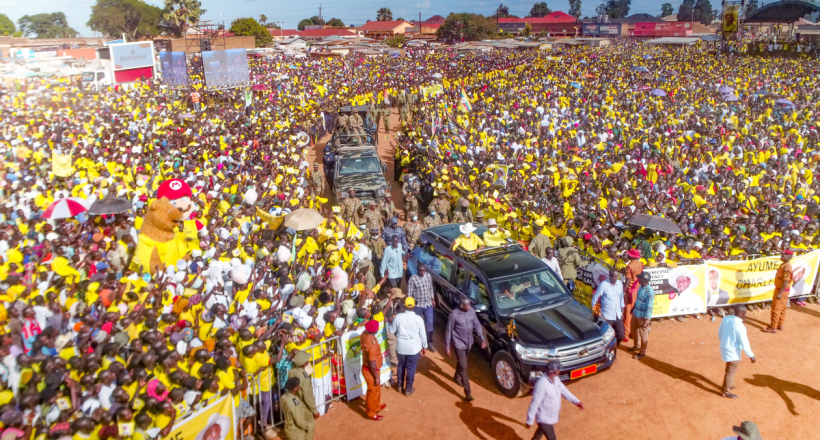
President Yoweri Museveni has reaffirmed that Uganda’s lasting peace is a result of deliberate efforts by the National Resistance Movement (NRM) to build strong, inclusive institutions rooted in patriotism, unity, and African solidarity.
While campaigning at Ombachi Playground in Koboko, the President emphasized that peace was not accidental but a product of strategy, merit-based governance, and national reconciliation.
“We have built strong institutions—starting with the army, the police, the prisons, the judiciary, the civil service, and academia. These are national institutions, built on merit and not favoritism,” Museveni said.
He explained that during recruitment for forces like the UPDF, police, and prisons, each district receives a quota to ensure nationwide representation. “That’s how we maintain national unity and ownership,” he added.
Museveni stressed that the combination of strong armed forces and political unity has guaranteed Uganda’s peace, but that military power alone would not have been enough.
“We’ve also used reconciliation to make peace. That is why, when assessing who truly stands for peace, remember that the NRM has unmatched credentials.”
He went on to provide a historical overview of peace in the region, pointing out that true stability had not existed for over 500 years.
“Some people speak as if this region only came to life when the colonialists arrived. But I am part of one of the most indigenous communities in this area,” he said. “Between 900 AD and 1400 AD, we had peace under the Bachwezi dynasty, which governed large parts of Uganda, Congo, northwestern Tanzania, and parts of Rwanda.”
He noted that names like Wamala and Ndahura, found across Uganda, Eastern Congo, and Tanzania, are rooted in the Bachwezi legacy. “But after the collapse of the Bachwezi dynasty around 1400, our people were plunged into endless wars, fueled by the short-sightedness of traditional kings.”
Museveni recounted that even during colonial rule, Uganda was not fully pacified.
“The Karamojong kept raiding. After independence, things only got worse—first with the conflict between Mutesa and Obote in 1966, followed by Idi Amin’s regime from 1971 to 1979, and later the civil wars between the NRA and other groups from 1981 to 1986.”
Even after the NRM came to power, Uganda still faced multiple rebellions. But through a mix of military action and reconciliation, the government managed to bring back stability. “It’s not a coincidence that Uganda is peaceful now. It’s because of the deliberate and correct policies of the NRM.”
Speaking on the NRM’s legacy, Museveni said that peace is the foundation upon which all other development rests.
“In our current manifesto, we outlined seven key points. I will talk about four today. The first is peace—and yes, it is true—the NRM has brought peace to this country for the first time in 500 years.”

